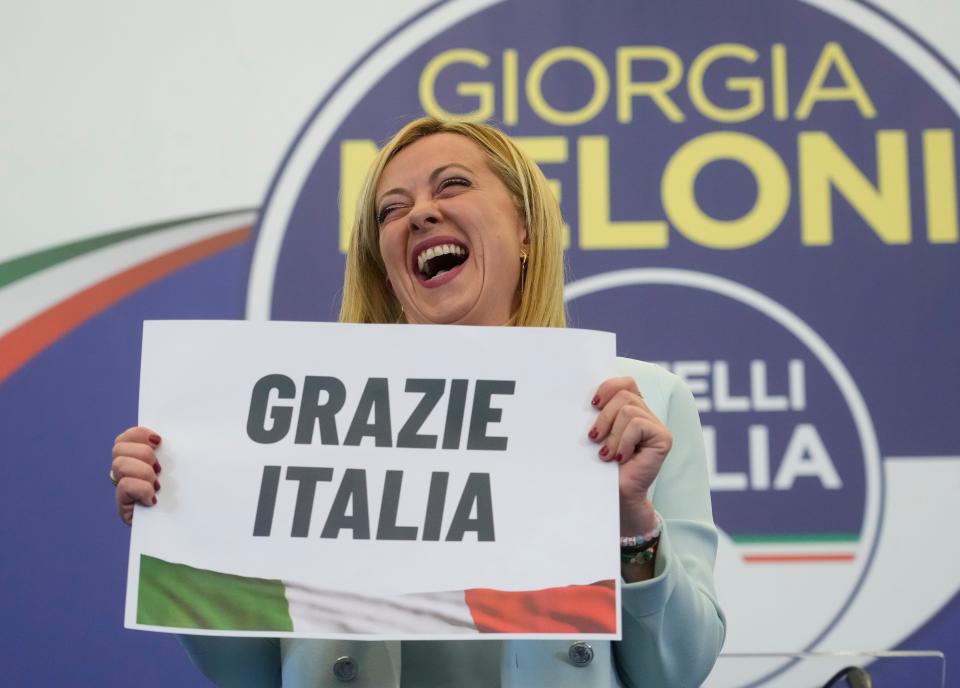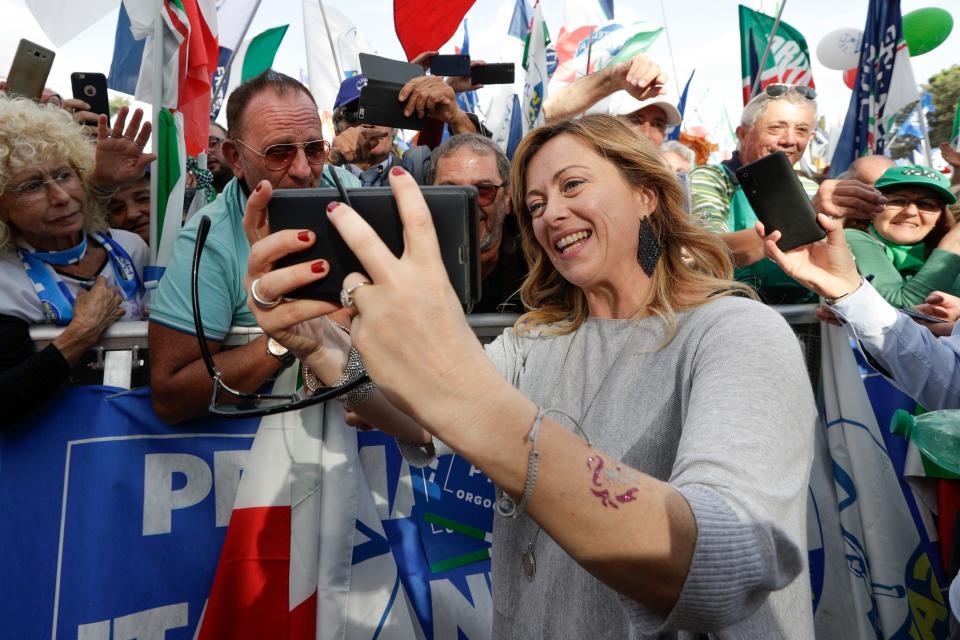'Italy chose us': Who is Giorgia Meloni, likely to be nation's first female leader?
ROME – Her party's flag features a tricolor flame popularized by Benito Mussolini and she still uses a slogan favored by fascists – "God, Fatherland and family." She opposes LGBT+ and abortion rights, which she has described as a "tragedy." She wants to set up naval blockades to block migrants from reaching European shores.
But Giorgia Meloni, Italy's presumptive first female prime minister and the country's first far-right leader since World War II, has nevertheless promised that she will govern on behalf of all Italians, no matter their beliefs or whether they voted for her.
"If we are called to govern this nation, we will do it for everyone, we will do it for all Italians and we will do it with the aim of uniting the people," Meloni said early Monday after claiming victory in a general election that puts the 45-year-old from a working class Rome neighborhood on track to become Italy's eighth prime minister in 11 years.
"Italy chose us," she said. "We will not betray it, and we never have."
Election results: Italy shifts to the right as voters reward Giorgia Meloni's Brothers of Italy party

The latest
Italy has a coalition-style government, where like-minded parties join forces to form a government. Preliminary results show that Meloni’s Brothers of Italy party and its right-wing alliance partners the League, led by Matteo Salvini, and Forza Italia, led by former prime minister and billionaire media tycoon Silvio Berlusconi, collectively won around 43% of the votes in the election.
Because Italy's voting system gives Meloni's party extra seats as the largest party, winning around 26%, that gives her the inside track to become Italy's next prime minister if the parties work together, as they have vowed to do.
The final tallies are expected later Monday or on Tuesday from Italy's interior ministry. However, the formal process of forming a government is a burdensomeone that is unlikely to unfold before mid-October.
Meloni's frontrunner status has unnerved Italy's allies in the European Union, coming as it does on the heels of an election in Sweden, where more than 1-in-5 Swedes voted for the Sweden Democrats, an anti-immigration party that can trace its roots to founders who were Nazi sympathizers. Meloni has in the past been an apologist for Italy's fascist World War II dictator Benito Mussolini and expressed support for Hungary's right-winter leader Viktor Orban, as well as Russian President Vladimir Putin, though she insists she will be a reliable leader.
What's next?
Once the results are confirmed, Italian President Sergio Mattarella will consult with the major parties before asking one leader – almost surely Meloni – to try to form a majority coalition. That may be easier said than done, since Italian political parties are known for infighting and last-minute intrigues.
But, if successful, Meloni will present a proposed list of ministers for Mattarella's approval. If she gets it, the new government will be sworn in before standing for a confidence vote. If that's successful, it will take the reins of power.

What are they saying?
"When it comes to foreign policy, we will not see dramatic changes," said Oreste Massari, a political science professor at Rome’s La Sapienza University. "Meloni will have to be particularly cautious so she doesn’t upset financial markets and to avoid worrying Italy’s allies. Domestically, she has promised not to increase the deficit, so we’ll see how that goes. In terms of civil rights, social policy, that may change. The big challenge going into winter is energy. Italy can’t sign its own unilateral agreement with Russia, so it has to do what the government is already doing: diversifying energy generation and finding new sources to replace Russian gas.
"I like that (Meloni) has a working class background. She’s one of us," said Antonio Lori, 54, a public transportation worker who voted in the Rome neighborhood of Trastevere. "She understands regular people. Up to now, it’s been elites on one side and then on the other. It’s time for a regular person to have a chance.”
“She’s modern. She doesn’t take orders from Brussels. We’re a great country, and we aren’t always treated like one," said Annalisa Lubrano, 23, a university student in Rome. "This is the first time I voted in a national election and I didn’t vote for a specific party. I voted for Italy to be treated with respect.”
There have been guarded reactions from European leaders, apart from Hungary's Orban, who wrote on Twitter: “In these difficult times, we need more than ever friends who share a common vision and approach to Europe’s challenges.” French President Emmanuel Macron's office said in a statement: "As neighbors and friends, we must continue to work together."
U.S. Secretary of State Antony Blinken wrote on Twitter that Washington was "eager to work with Italy's government on our shared goals" including "supporting a free and independent Ukraine" and "respecting human rights."
Why does this matter?
Italy is one of six founding members of the EU and it's the bloc’s third-largest economy. In the past, Italy has played a valuable role as a bridge between Europe and antagonistic governments in Russia and China, and in some Middle Eastern nations.
Meloni has already said that under her leadership, Italy will stand by Ukraine, and she has had to row back earlier calls for closer ties with Vladimir Putin's Russia. But she has said she wants to pull out of Italy’s Belt-and-Road infrastructure pact with China signed in 2018, robbing Beijing of a major European foothold (Italy remains the only major western country to sign onto the initiative). Her plans to blockade the Mediterranean – admittedly dismissed by most analysts as a campaign applause line – would not win friends in the region.
More importantly, Meloni's win could shift the balance of power in the EU away from traditional powers like France and Germany toward right-wing governments in Hungary, Poland, and now Sweden. Few think Italy will leave the EU or NATO, but it will create a delicate balancing act for the EU when it comes to presenting a decisive, united front on climate or energy.
Meloni's supporters see her as a kind of modern-day Margaret Thatcher, unafraid to challenge traditional powers. But that anti-authoritarian political DNA could also likely make Italy a less reliable partner in U.S.-led coalitions, though Meloni has been careful to steer clear of making comments about U.S. leaders.
This is all assuming, of course, that a Meloni government is able to remain in power for more than a few months. Brothers of Italy’s success at the polls is significant, but the next government will be Italy's 74th in the 79 years since the fall of Italy's last far-right government, Mussolini’s Fascists – nearly one government per year.
Want to know more?
Italy votes: Far-right leader Giorgia Meloni's alliance leads national vote, exit poll
Italy shifts to the right: Voters reward Giorgia Meloni's Brothers of Italy party
This article originally appeared on USA TODAY: Giorgia Meloni: Who is Italy's most far-right leader since Mussolini?

 money
money 